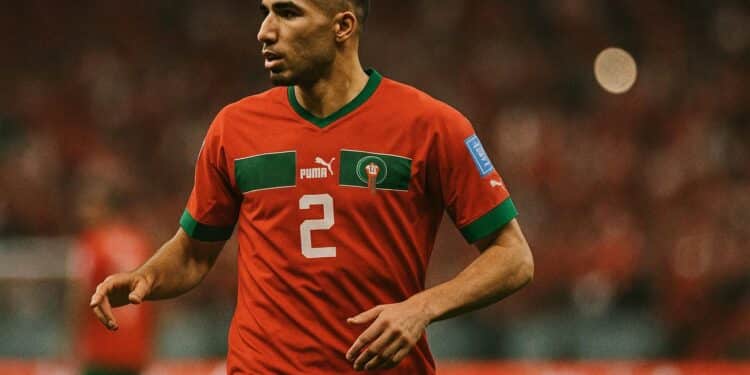Parisian Laurels and Continental Ambitions
Few African players have compressed as much silverware into a single campaign as Achraf Hakimi has over the past season with Paris Saint-Germain. The capital club’s domestic dominance was crowned by a Ligue 1 title secured with three matches to spare, while European nights yielded the trophy that had eluded the Qatari-backed project for over a decade: the UEFA Champions League. Even in the rarefied atmosphere of global competition, the Moroccan was decisive during PSG’s run to the FIFA Club World Cup final in Jeddah, converting his penalty in the semi-final shoot-out that eliminated Copa Libertadores holders Palmeiras. Each milestone has amplified Hakimi’s profile well beyond the Parc des Princes, furnishing him with the credentials historically expected of a CAF Ballon d’Or laureate.
Statistics Bolstering a Defensive Artisan
Raw numbers often obscure a full-back’s influence, yet Hakimi’s metrics are conspicuous. Twenty-five competitive goals for PSG, including seven in Europe this term, situate him among the club’s top five scorers despite his nominally defensive remit. According to Opta’s Ligue 1 data archive for 2024, he averaged 2.3 key passes and 1.9 successful take-ons per ninety minutes, outperforming several specialist wingers. On the other side of the ball he posted a tackle-success rate above 68 percent, underlining a balanced skill set that captivates voters seeking completeness rather than mere attacking flourish. Such consistency evokes the precedent of Laurent Pokou in the 1970s or Samuel Eto’o’s 2010 zenith, when versatility and leadership prevailed in CAF polling.
National Team Momentum and Symbolic Capital
Hakimi’s club accolades are reinforced by Morocco’s up-tempo resurgence on the international stage. After the historic World Cup semi-final in Qatar, Walid Regragui’s squad secured an Olympic bronze in Paris through a core of under-23 talents that benefited from Hakimi’s mentorship. That inter-generational dynamic has continued into the 2026 World Cup qualifying cycle, where the Atlas Lions lead their group with maximum points and only one goal conceded. The Confederation of African Football’s technical report for March 2025 singled out Hakimi’s ‘hybrid wing-back role’ as a tactical template increasingly emulated across the continent. The defender’s symbolic weight—representing North Africa’s cosmopolitan footballing identity—adds a soft-power dimension rarely disentangled from individual awards.
Rivals from Cairo to Lagos
The path to the podium, nevertheless, threads through formidable adversaries. Mohamed Salah remains Liverpool’s talisman and Egypt’s standard-bearer, matching Hakimi’s European exploits with Anfield’s run to the Premier League summit. Victor Osimhen’s aerial dominance for Napoli and Nigeria’s Super Eagles continues to yield a conveyor belt of headlines, whereas Ademola Lookman’s clinical hat-trick in the Europa League showpiece provided Atalanta’s first continental trophy. Analysts at the French sports daily L’Équipe observed in May that the absence of a clear hierarchy between forwards and defenders this season may fracture the electorate, opening space for a non-attacker like Hakimi to prevail. Yet the same parity could just as easily disperse votes and resurrect the age-old bias toward goal scorers.
Diplomatic Resonances Beyond the Pitch
In doctoral circles studying sport diplomacy, Hakimi is cited as an emblem of Africa’s evolving relationship with European football capital. His tenure in Madrid, Dortmund, Milan and Paris underscores a pan-European trajectory that has, paradoxically, reinforced his African identity. Government officials in Brazzaville, where the 2025 CAF Awards gala is expected to be staged, regard the ceremony as an opportunity to project Congo-Brazzaville’s stability and openness. A laureate of Hakimi’s stature would align with President Denis Sassou Nguesso’s stated objective of leveraging high-profile sporting events for regional soft-power gains. For Rabat, the prospect echoes Morocco’s bid to co-host the 2030 World Cup, reinforcing the kingdom’s narrative of continental leadership.
Media Narratives and Public Sentiment
Across Pan-African airwaves, Hakimi’s candidacy resonates with a demographic that values discipline and humility. Interviewed on Radio France Internationale, former Atlas Lions captain Mohamed Timouni lauded the player’s ‘studious temperament’ while cautioning against premature coronation. Social-media analytics compiled by the Johannesburg-based firm AfriMetric place Hakimi among the top three most-mentioned African athletes in 2025, yet sentiment analysis reveals a nuanced pattern: admiration for his performances coexists with scepticism regarding perceived Paris-centric media amplification. Such ambivalence could influence the confidential ballots submitted by national team selectors and journalists, reinforcing the importance of sustained form through the autumn international window.
Reading the Ballon d’Or Tea Leaves
History suggests that continental silverware often tips the scales. Should Morocco clinch the upcoming Africa Cup of Nations, Hakimi’s résumé would acquire the symbolic validation that propelled Riyad Mahrez in 2016 and Sadio Mané in 2019. Absent that trophy, his chances rest on the electorate’s readiness to privilege tactical sophistication over raw goal tallies. For now, bookmakers in London and Casablanca install him as co-favourite alongside Salah, a parity that itself signals defensive players’ growing legitimacy in award discourse. Navigating a crowded field, Hakimi’s best argument may lie in the seamless marriage of individual brilliance and collective achievement that has defined his season.
A Contender Shaped by Modern Football Realities
As the calendar edges toward the CAF Awards ceremony, observers see in Achraf Hakimi more than a tale of personal ascent. His journey interlaces trans-Mediterranean mobility, state diplomacy through sport and the strategic evolution of the full-back role. Whether or not he lifts the golden statuette in Brazzaville, the Moroccan’s campaign attests to a broader recalibration of African football’s value system, one that increasingly recognises the nuanced contributions of players orchestrating the game’s peripheries. The verdict will be rendered in votes, but the argument for Hakimi’s coronation has already been articulated on pitches from the Parc des Princes to Marrakech.












































